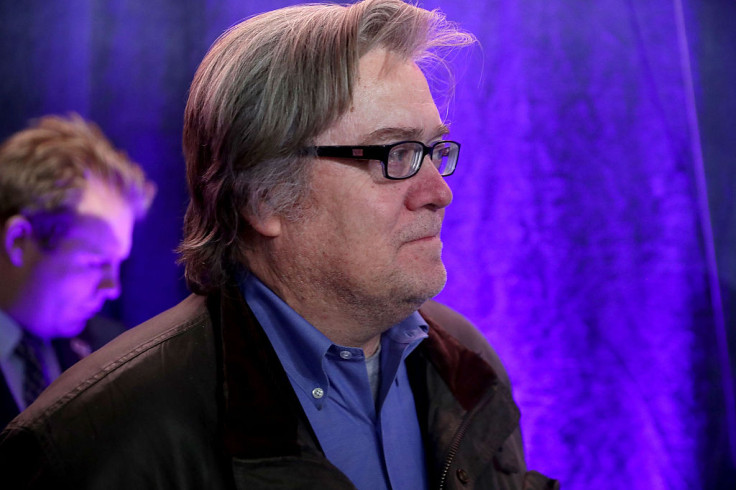Right-wing rabble-rouser Steve Bannon tipped for key role in Trump's White House
Bannon is credited with helping turn Trump's campaign around and whipping up white working class support.
As the dust settles on the bruising US Presidential campaign, discussion has turned to the Trump cabinet. Who will take the top jobs in the most powerful government on the planet?
Among those reportedly at the top of the list is Steve Bannon, Donald Trump's campaign chief, credited with playing a vital role in turning around the Republican's stuttering campaign and steering the property magnate to the Oval Office.
Bannon, 62, has been described as "Purely Machiavellian" and "egomaniacal" by former employees of the Breitbart news website, where he was CEO for four years.
It was while Bannon was at the helm at Breitbart that the website became notorious for the closed border, white identity politics that Trump parroted on the campaign trail, and which subsequently propelled him to the White House.
Unlike the Washington insiders he professes to despise, Bannon is relatively new to the world of politics. Raised in a blue collar family in Virginia, he received an MBA from Harvard Business School, before serving as an officer in the US Navy followed by a well-paid job as an investment banker at Goldman Sachs.
He said he doesn't like Jews and that he doesn't like the way they raise their kids to be 'whiney brats
He reportedly made a fortune buying shares from royalties for the comedy Seinfeld, which he still receives.
As a minor Hollywood player, Bannon worked on a film with Sean Penn, before moving into polemical right-wing documentaries. He made a film lionising Tea Party darling Sarah Palin, and another attacking the grass roots Occupy movement, portraying them as rioters backed by the liberal elite.
His film work brought Bannon into contact with right-wing, anti-establishment journalist Andrew Breitbart, founder of the news website which bears his name. After Breitbart's premature death at 43, Bannon took the helm at Breitbart.

Under Bannon's stewardship the website pushed conspiracy theories and a virulently anti-immigrant agenda, gaining a new audience in the 'alt-right', a movement fiercely opposed to the Republican establishment who use social media to promote white supremacist views.
Breitbart relentlessly championed Trump as the reality star's candidacy gained momentum, savaging his Republican rivals and lauding his anti-immigrant, anti-Islam policies. Bannon even sided with Trump when former campaign manager Corey Lewandowski was charged with battery against one of the website's reporters, Michelle Fields.
His stance prompted the resignation of several staffers, including editor-in-chief James Shapiro, who accused his former boss of turning the website into "Trump Pravda", and failing to pursue its founder's mission of holding "bullies" to account.
Bannon was recruited to re-invigorate Trump's bid for the White House in August, alongside Republican pollster Kellyanne Conway. He is credited with persuading Trump to focus on winning over white, working class voters whose support proved crucial to his victory in Rust Belt former Democrat strongholds.
There was also controversy though, when it emerged that an ex-wife of Bannon had accused him of making anti-Semitic remarks.
"He said he doesn't like Jews and that he doesn't like the way they raise their kids to be 'whiney brats,'" Mary Louise Piccard said in a 2007 court filing.
Bannon had a lower profile than Conway during the campaign. She would regularly appear on news outlets as a "Trump surrogate". In one of only two interviews during the campaign, with the Breitbart.com radio podcast, he insisted that he would return to his job as Breitbart CEO after the election, and described his global vision for the right-wing populist "movement".
"This whole movement has a global aspect to it," said Bannon. "People want more control of their country. And they are very proud of their countries. They want borders. They want sovereignty. It's not just a thing that is happening in any one geographic space. You can see it happening in Asia, you can see it happening in Europe, you can see it happening in the Middle East, and you're seeing it happen in the United States."
The New York Times reported that Bannon was now a leading candidate to become Trump's chief of staff, with his inner circle regarding him as a positive influence on the president-elect.
Whether Bannon continues to wage his populist right revolution in the corridors of the White House or through the expanding Breitbart network, his influence seems set to spread.
© Copyright IBTimes 2025. All rights reserved.






















